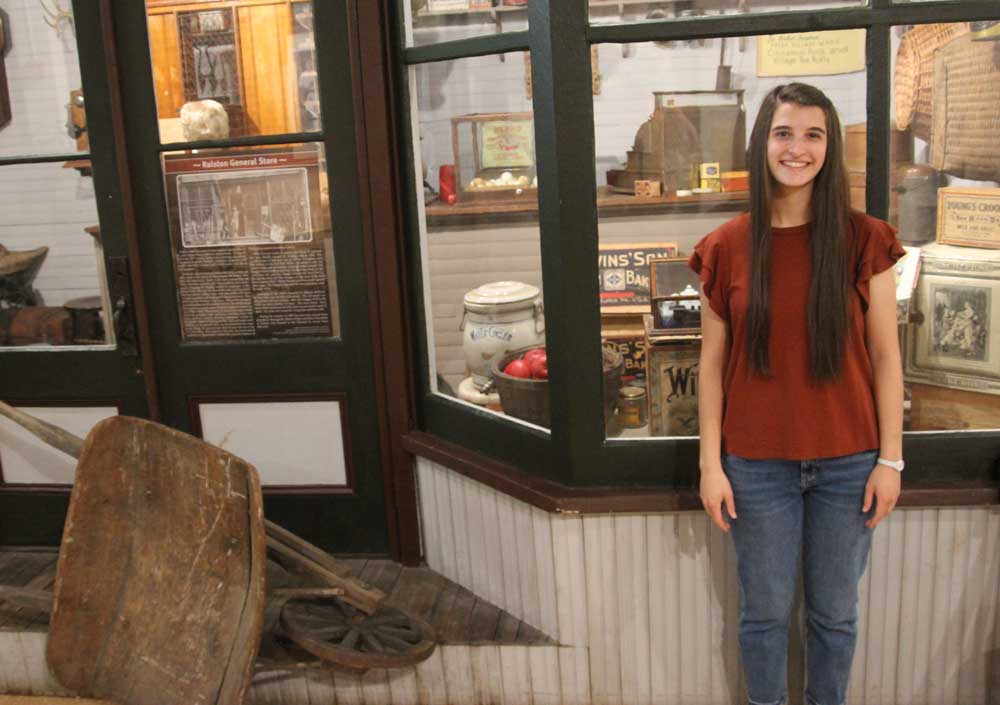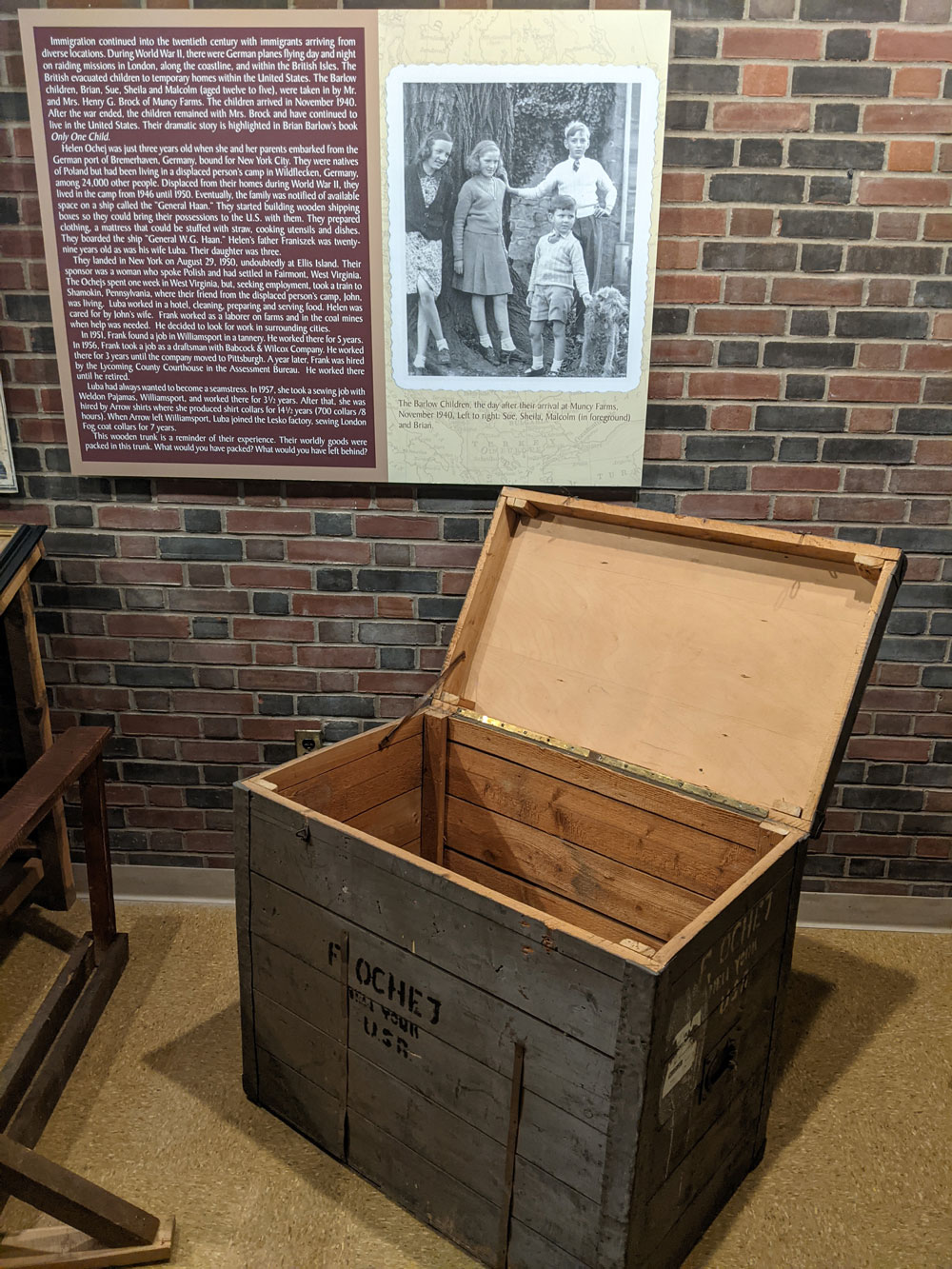
The winner of The Richard L. and Miriam L (Swan) Mix Student Historian Award winner was announced at the Lycoming County Historical Society Annual meeting. This year's winner is Lea Worthington, a senior at Montoursville High School for her essay on the life of Italian immigrants.
Lea received a $500 award from the Society. This year's award was provided by a friend of the Society, Andrea Bashore. Thank your Andrea - Good luck Lea with your college adventure.
Here is the essay:
My Life as an Italian Immigrant
One special occasion today took our minds off of the sticky, hot August heat. The heaviness of the weather this week has made us all quick-tempered. We are glad for frequent visits to the cool Susquehanna river, although Mother is still apprehensive and does not go out past her knees. But this morning, we received a letter from home in Italy – an event we all look forward to. We waited until after dinner, when we were all together, to read it. Nonno and Nonna gave their love and thanks for the money Mother and Father have been sending. We got a picture of Luigi, too; he wrote that he is fine. Luigi is my brother (one year older than me) who we left in Italy. My younger brother Antonio, age twelve, misses his older brother, as the rest of us are girls. My name is Gelsomina and I am the second of five siblings; I am fifteen years old. My sisters are Michelina, age ten, Carmela, age six, and Filomena, age three.
Three years ago in 1922, our family emigrated from Sperone, Italy, a small town east of Naples. Mother’s relatives still live there and they make barrels for wine. That is where Luigi is working until he saves enough money to come to America. Father is saving money too, but scarcely. He and Uncle Angelo own a truck farm in Williamsport right on the south side of the river, where we live. We grow Italian heirloom tomatoes from seeds Father brought over, peppers, cucumbers, beans, strawberries, and watermelons. Five days a week, Father loads the horse drawn farm wagon full of harvested fruits and vegetables to take to the market. Sometimes, my siblings and I are allowed to ride in the back. The roads on the way to town are quite bumpy and dusty, but we always enjoy going along. Many of the neighboring farms have motor trucks, but Father and Uncle Angelo cannot afford one yet.
The farm is very labor intensive – a morning-to-night family operation. During the summer, all of my siblings, cousins, and I work in the field picking crops. This week the weather has been particularly uncomfortable – almost dangerously hot. We are praying for cooler days to come, as Mother worries about our health. She and Aunt Mary work in the garden too, but they also take care of household duties and make our daily meals. For breakfast, we usually eat slices of homemade bread. Mother and Father drink coffee, but they say we are too young for that yet. Dinner and supper change from day to day because we use what we have available. Yesterday we ate roasted red peppers from the garden, and today we ate pasta and beans. Pasta is my personal favorite because it reminds me of when we lived in Italy, where there are multiple pasta makers on every street. More memorably, making pasta was something we did every Sunday with Nonna; now we only make it when there is time.
When we go to the market in town, we stop at the general store for essential household and farming items. The general store has big glass display windows, and inside there are new commodities like electric lights and an icebox. It is also the site of the post office, so it is frequently visited by neighbors and friends. Sometimes Father stops to talk to a neighbor or friend, and if he has extra pennies when we come along, he lets each of us pick out penny candy from big glass containers on the counter. I also love to look at the new fabrics and dresses on display before we leave.

There are two days a week that we do not go to the market: Sundays and Wednesdays. That means that on Saturdays and Tuesdays, we do not have to prepare. On those days my siblings and I spend the day with Mother completing household tasks. We use the wood-burning, cast iron cookstove, to bake bread and heat water for canning. I love the way the house smells on bread baking days. On special occasions, we will bake a sweet dessert, as sugar is expensive. These days are also wash days, which involves filling the metal tub with water and using the wash plunger to agitate the clothing; we hang the clothes on the clothesline outside to dry. Saturdays and Tuesdays are cleaning days, too. In cleaning the house, we sweep the floors with a broom, beat the rugs, and wash the windows. Some of these chores are completed throughout the rest of the week as well.
Sunday is a day of rest, which is much needed to gain strength for the next week. Our family is Catholic, but we have not gone to church since we came here. Mother knows of an Italian Catholic Church on Market street, but feels that our clothes are not nice enough to go. I loved when we used to attend mass, and I do not think the quality of our clothes should hold such importance.
Although we do not go to church, we do go to school. At the beginning of next month – September – Antonio, Michelina, Carmela, and I will start a new year. Filomena is too little yet, so she will stay home with Mother. Carmela and Michelina will go to the Main Street grammar school, and Antonio and I will go to South Williamsport Junior and Senior High School. On school mornings we have to get up extra early to walk, even in unpleasant weather. We like school now that we have friends, but at first we struggled. Before we came to the United States, Mother and Father explained that we would be starting a new life, and starting a new life meant adapting to a new language and culture. They also told us that we might be teased in school because of our nationality. Our first year in school did bring some teasing, but we soon realized that there are quite a few Italian families in our community. Likewise, we had many Italian children as our classmates. Once we learned English – which was challenging because we mostly speak Italian at home – and other children could get to know us, the “offensiveness” of our culture wore off.
We are settling in here, and amidst the differences, we are thankful to live in the United States. We are thankful for the opportunity here, and for hope that things will get better. We look forward to when Luigi will come and our family will be complete. And, in two short years, Father wants to apply for naturalization.
The oil in my lamp is about to burn out and it is getting late, so I should stop writing. These details are a small portion of what our days are like, but I hope this gives a glimpse into my life as an Italian immigrant.